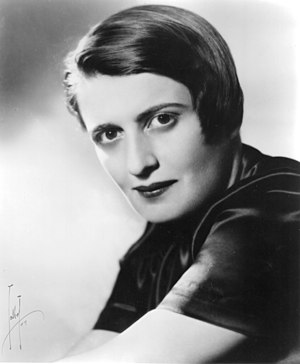
The unrecognized genius—that’s an old story. Have you ever thought of a much worse one—the genius recognized too well? ... That a great many men are poor fools who can’t see the best—that’s nothing. One can’t get angry at that. But do you understand about the men who see it and don’t want it?
Share this quote:
I have yet to see a genius or a hero who, if stuck with a burning match, would feel less pain than his undistinguished average brother.
Share this quote:
The unrecognized genius-thats one old story. Have you ever thought of a much worse one-the genius recognized too well?
Share this quote:
It [ballet] projects a fragile kind of strength and a certain inflexible precision.
Share this quote:
It [ballet] is a perfect medium for the expression of spiritual love.
Share this quote:
A gracefully effortless floating, flowing and flying are the essentials of the ballet’s image of man.
Share this quote:
Its easy to run to others. Its so hard to stand on ones own record. You can fake virtue for an audience. You cant fake it in your own eyes. Your ego is your strictest judge. They run from it. They spend their lives running. Its easier to donate a few thousand to charity and think oneself noble than to base self-respect on personal standards of personal achievement. Its simple to seek substitutes for competence--such easy substitutes: love, charm, kindness, charity. But there is no substitute for competence.
Share this quote:
Only a man of integrity can possess the virtue of honesty, since only the faking of one’s consciousness can permit the faking of existence.
Share this quote:
Degrees of ability vary, but the basic principle remains the same: the degree of a mans independence, initiative and personal love for his work determines his talent as a worker and his worth as a man. Independence is the only gauge of human virtue and value. What a man is and makes of himself; not what he has or hasnt done for others. There is no substitute for personal dignity. There is no standard of personal dignity except independence.
Share this quote:
This is pity,” he thought, and then he lifted his head in wonder. He thought that there must be something terribly wrong with a world in which this monstrous feeling is called a virtue.
Share this quote:
Men have been taught that it is a virtue to agree with others. But the creator is the man who disagrees. Men have been taught that it is a virtue to swim with the current. But the creator is the man who goes against the current. Men have been taught that it is a virtue to stand together. But the creator is the man who stands alone.
Share this quote:
You can fake virtue for an audience. You can’t fake it in your own eyes. Your ego is your strictest judge. They run from it. They spend their lives running.
Share this quote:
What would happen to the world without those who do, think, work, produce? Those are the egotists. You don’t think through another’s brain and you don’t work through another’s hands. When you suspend your faculty of independent judgment, you suspend consciousness. To stop consciousness is to stop life.
Share this quote:
If the rest of them can survive only by destroying us, then why should we wish them to survive? . . . Nothing can make it moral to destroy the best. One cant be punished for being good. One cant be penalized for ability.
Share this quote:
[Howard Roark] was asked for a statement, and he received a group of reporters in his office. He spoke without anger. He said:I cant tell anyone anything about my building. If I prepared a hash of words to stuff into other peoples brains, it would be an insult to them and to me. But I am glad you came here. I do have something to say. I want to ask every man who is interested in this to go and see the building, to look at it and then to use words of his own mind, if he cares to speak.The Banner printed the interview as follows:Mr. Roark, who seems to be a publicity hound, received reporters with an air of swaggering insolence and stated that the public mind was hash. He did not choose to talk, but seemed well aware of the advertising angles of the situation. All he cared about, he explained, was to have his building seen by as many people as possible.
Share this quote:
He saw the article...which was not an expression of ideas, but a bucket of slime emptied in public—an article that did not contain a single fact, not even an invented one, but poured a stream of sneers and adjectives in which nothing was clear except the filthy malice of denouncing without considering proof necessary.
Share this quote:
...What kind of a tragedy did you have in your childhood?Why, none at all. I had a wonderful childhood. Free and peaceful and not bothered too much by anybody. Well, yes, I did feel bored very often. But I’m used to that.
Share this quote:
...he had never known fear because, against any disaster, he had held the omnipotent cure of being able to act.
Share this quote:
The audience looked at him. They felt he had no chance. They could drop the nameless resentment, the sense of insecurity which he aroused in most people. And so, for the first time, they could see him as he was: a man totally innocent of fear.
Share this quote:
He saw for the first time that he had never known fear because, against any disaster, he had held the omnipotent cure of being able to act.
Share this quote: